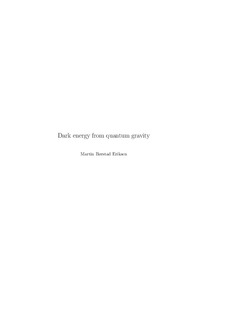| dc.contributor.author | Eriksen, Matin Børstad | nb_NO |
| dc.date.accessioned | 2014-12-19T13:16:17Z | |
| dc.date.available | 2014-12-19T13:16:17Z | |
| dc.date.created | 2009-11-09 | nb_NO |
| dc.date.issued | 2009 | nb_NO |
| dc.identifier | 275955 | nb_NO |
| dc.identifier.uri | http://hdl.handle.net/11250/246250 | |
| dc.description.abstract | The thesis consists of two parts, where the last one tries to model the evolution of the universe by using a scalar field. Within this class of models there is a huge amount of freedom and few simple restrictions. Often only examples are studied which are just tested against a subset of the requirements. In a try of being more systematic I developed a simulation for proposing and testing different evolutions of the universe more comprehensively.
A large subset of the proposed models pass the tests, and singling out models against observed requirements is like trying to start from the answer. For this reason I began to look for an underlying reason for the expansion of the universe. All conventional scalar field models are based on classical fields. Could the observed accelerated expansion of the universe emerge as a quantum gravitational phenomenon? The goal was a bit farfetched, but would provide a natural explanation for the expansion and could add insight to the field of quantum gravity.
After a longer period of unsuccessful tries, it was about time to write down the first draft of the thesis. It consisted of a review of dark energy models and quantum gravitational theory. Shortly after finishing the second revision I found a new way of attacking the problem. After a week of calculations I came to the conclusion that the new approach made sense and started over again, discarding the old draft.
The first part, which I regard to be the most important one, contains the new ideas and calculations. Here I studied the effect of uncertainties in the measurement of parallel transported four-vectors. This way of modelling quantum mechanical effects leads to a term which can cancel the vacuum energy contribution. The expansion of space results in an imperfect cancellation leading to a term equal to the observed dark energy. Though the results are not fully rigorous, since they aren't based on a fully developed theory of quantum gravity, they are surprising and give a reasonable basis for further studies.
| nb_NO |
| dc.language | eng | nb_NO |
| dc.publisher | Norges teknisk-naturvitenskapelige universitet, Fakultet for naturvitenskap og teknologi, Institutt for fysikk | nb_NO |
| dc.title | Dark energy from quantum gravity | nb_NO |
| dc.type | Master thesis | nb_NO |
| dc.contributor.department | Norges teknisk-naturvitenskapelige universitet, Fakultet for naturvitenskap og teknologi, Institutt for fysikk | nb_NO |
